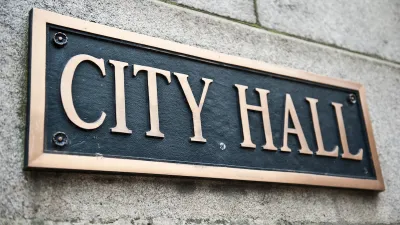Oregon's property rights issues should serve as a cautionary tale for the rest of the country, according to this article from Metropolis.
"As planners and designers nationwide are faced with reducing carbon emissions, they float ideas that sound Oregonian. The LEED for Neighborhood Development certification program, for example, may require dramatically increasing density and restricting building on ecologically sensitive open land while promoting the reuse of industrial brownfields and obsolete grey-fields. Oregon had already been a long way toward achieving these goals before Measure 37 weakened the state's stiff rural-development restrictions. Then a vote last November, little noticed outside the state, sweepingly reversed almost all of the legislation. These whipsawing policies exposed raw but often unexamined emotions about Americans' relationship to land. Oregon's property-rights battle serves as a cautionary tale for environmentalists nationwide."
"The abrupt transition between rural and urban is pretty much unique to Oregon, and it drives some landowners crazy. After all, land values on the urban side of the growth boundary, where you might be able to build upward of half a dozen houses every acre, may be many times those on the rural side, where often only one house is permitted per 80 acres. To many it seems patently unfair for a government commission to draw a line that has such extraordinary impact on a given parcel's destiny."
FULL STORY: Whose Property Rights?

Planetizen Federal Action Tracker
A weekly monitor of how Trump’s orders and actions are impacting planners and planning in America.

San Francisco's School District Spent $105M To Build Affordable Housing for Teachers — And That's Just the Beginning
SFUSD joins a growing list of school districts using their land holdings to address housing affordability challenges faced by their own employees.

The Tiny, Adorable $7,000 Car Turning Japan Onto EVs
The single seat Mibot charges from a regular plug as quickly as an iPad, and is about half the price of an average EV.

Seattle's Plan for Adopting Driverless Cars
Equity, safety, accessibility and affordability are front of mind as the city prepares for robotaxis and other autonomous vehicles.

As Trump Phases Out FEMA, Is It Time to Flee the Floodplains?
With less federal funding available for disaster relief efforts, the need to relocate at-risk communities is more urgent than ever.

With Protected Lanes, 460% More People Commute by Bike
For those needing more ammo, more data proving what we already knew is here.
Urban Design for Planners 1: Software Tools
This six-course series explores essential urban design concepts using open source software and equips planners with the tools they need to participate fully in the urban design process.
Planning for Universal Design
Learn the tools for implementing Universal Design in planning regulations.
Smith Gee Studio
City of Charlotte
City of Camden Redevelopment Agency
City of Astoria
Transportation Research & Education Center (TREC) at Portland State University
US High Speed Rail Association
City of Camden Redevelopment Agency
Municipality of Princeton (NJ)




























